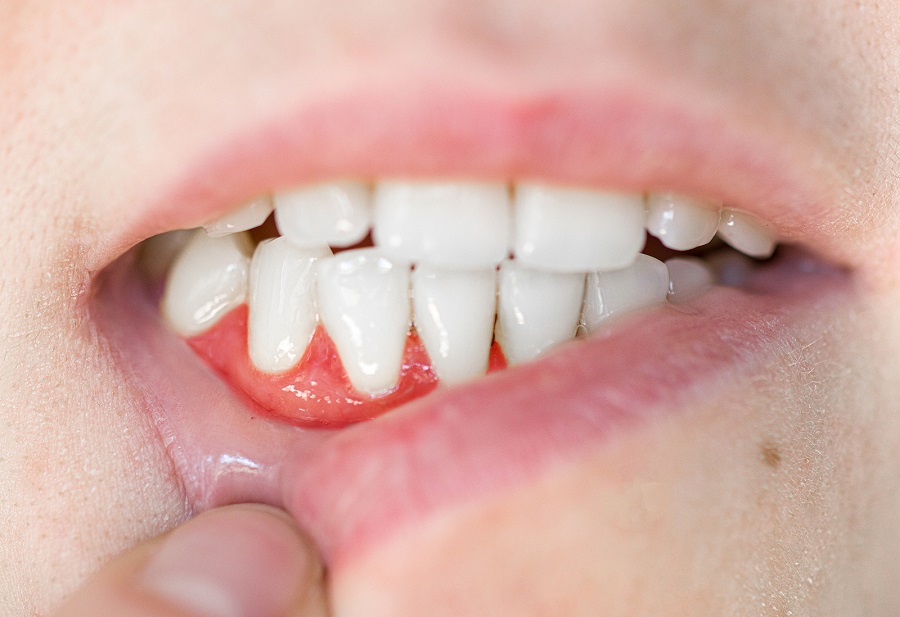Gum disease, also known as periodontal disease, is an infection of the tissues that surround and support your teeth. It starts with the buildup of plaque, a sticky film containing bacteria, on your teeth. If left untreated, it can progress from mild inflammation (known as gingivitis) to more severe forms that can lead to tooth loss.
The initial signs of gum disease may be subtle - you might notice some redness or swelling in your gums or experience occasional bleeding while brushing or flossing. As the condition progresses, these symptoms can worsen, and you may even develop bad breath or a persistent metallic taste in your mouth.
What Causes Gum Disease?
- Several factors contribute to the development of gum disease. One primary cause is poor oral hygiene. Inadequate brushing and flossing allow plaque to build up on teeth, leading to bacterial growth and inflammation in the gums.
- Another factor is smoking or tobacco use. Smoking weakens the immune system and restricts blood flow, making it harder for your body to fight off infections in your mouth.
- Certain medical conditions, such as diabetes, can also increase your risk of developing gum disease. Diabetes impairs blood circulation and weakens your body's ability to heal itself, making it easier for bacteria to thrive in your mouth.
- Hormonal changes during pregnancy or menopause can make women more susceptible to gum diseases due to increased blood flow and hormonal fluctuations affecting gum tissue sensitivity.
- Genetics may play a role in determining one's susceptibility to gum disease. Some individuals may have inherited traits that make them more prone to developing this condition, even with proper oral care routines.
It's important not only for our dental health but also our overall well-being that we understand what causes gum disease so we can take proactive steps towards prevention through regular dental check-ups, practicing good oral hygiene habits daily, avoiding smoking or tobacco use, managing underlying medical conditions effectively, and being aware of our genetic predisposition for certain health issues related.
How to Prevent Gum Disease
Maintaining good oral hygiene is crucial in preventing gum disease. Here are some simple yet effective steps you can take to keep your gums healthy.
- Make sure to brush your teeth twice a day with a soft-bristled toothbrush and fluoride toothpaste. Take the time to thoroughly clean all surfaces of your teeth, including along the gumline. Remember to replace your toothbrush every three to four months.
- Flossing should also be a part of your daily routine. This helps remove plaque and food particles from between your teeth and along the gum line, which brushing alone may not reach. Use gentle back-and-forth motions, being careful not to snap the floss against your gums.
- Regular dental check-ups are essential for early detection and prevention of gum disease. Your dentist will perform a thorough examination, removing any built-up tartar or plaque that cannot be removed through regular brushing and flossing.
- A balanced diet is beneficial not only for overall health but also for maintaining healthy gums. Limit sugary snacks and beverages as they contribute to plaque formation. Instead, opt for fresh fruits and vegetables that stimulate saliva production, which helps neutralize acid in the mouth.
- Avoid smoking or using tobacco products as they significantly increase the risk of developing gum disease. Smoking weakens the immune system's ability to fight infection, making it easier for bacteria to attack the gums.
By following these preventive measures consistently, you can greatly reduce your chances of developing gum disease and maintain optimal oral health.
Contact our office at (225) 926-4640 today to learn more and to schedule your next appointment with us. You can also visit our dentist in Baton Rouge, LA, at 4616 Concord Avenue, Baton Rouge, LA, 70808.
Location
4616 Concord Ave,
Baton Rouge, LA 70808
Office Hours
MON7:00 am - 5:00 pm
TUE7:00 am - 4:00 pm
WED7:00 am - 6:00 pm
THU7:00 am - 4:00 pm
FRI7:00 am - 2:00 pm
SAT - SUNClosed
4616 Concord Ave,
Baton Rouge, LA, 70808
Phone: (225) 926-4640Text Us: (225) 926-4640






